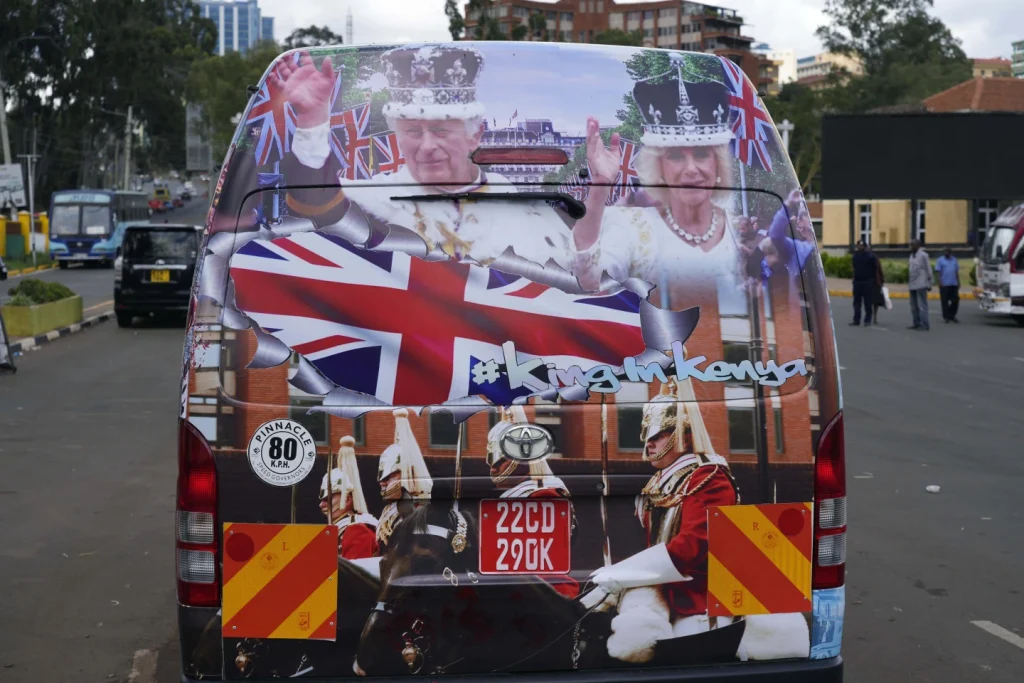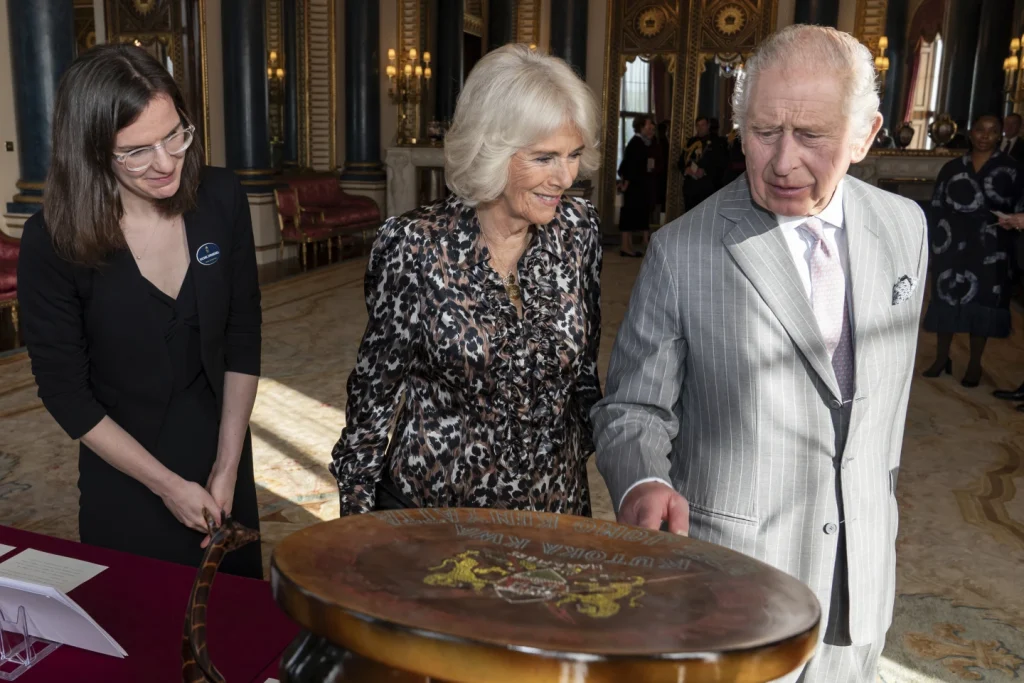King Charles III’s upcoming state visit to Kenya is poised to be a pivotal moment in his reign, as it presents an opportunity to address the complex and contentious issues stemming from Britain’s colonial past.
While the king eagerly looks to the future, he must first confront the historical grievances that have persisted for decades.
As preparations for the four-day trip are underway, calls for Charles to acknowledge the legacy of British colonial rule have intensified.
Criticisms have also been raised regarding the continued ownership of valuable agricultural land by foreigners, as well as Britain’s alleged failure to take responsibility for the actions of its soldiers stationed in Kenya.
The significance of this visit extends beyond the bilateral relations between the United Kingdom and Kenya, as it marks the king’s inaugural state visit to an African nation and his first visit to a Commonwealth member since ascending the throne last year.
Against the backdrop of mounting global pressure, both the U.K. and the royal family find themselves at a crossroads, compelled to reevaluate the historical implications of colonialism and contemplate the necessity of issuing an apology for Britain’s involvement in the trans-Atlantic slave trade.
As the world watches closely, the outcome of this state visit has the potential to shape the trajectory of the U.K.’s relationship with its former colonies and redefine the monarchy’s role in addressing historical injustices.
Britain and Kenya share a complex history that is rich in symbolism and significance. However, beyond the historical and cultural ties, both countries have forged a modern relationship that is built on cooperation in various areas.
One of the key areas of cooperation between Britain and Kenya is counterterrorism, with both countries working together to combat the threat of terrorism.
Additionally, the two nations have been working hard to boost trade, with the total trade volume between the two countries amounting to more than 1.1 billion pounds ($1.3 billion) per year.
This underscores the importance of the relationship between Britain and Kenya, which is based on mutual benefit and shared interests.
Prince Charles, who is currently on a visit to Kenya, is keen to emphasize the importance of environmental protection during his trip. As part of his visit, he will be visiting a national park to see the vital conservation work that is being undertaken by the Kenyan Wildlife Service.
This visit is a testament to Prince Charles’ commitment to environmental protection and his desire to promote sustainable development in Kenya.
It is also a reflection of the close relationship between Britain and Kenya, which is based on shared values and a common vision for the future.
In conclusion, the relationship between Britain and Kenya is multifaceted and goes beyond the historical and cultural ties that bind the two nations.
The modern relationship is based on cooperation in various areas, including counterterrorism and trade, and is underpinned by shared values and a common vision for the future.
Prince Charles’ visit to Kenya is an opportunity to strengthen this relationship and to promote environmental protection and sustainable development in the region.
The king has demonstrated a commendable willingness to confront challenging issues, exemplified by his decision to grant researchers access to the royal archives in order to investigate the monarchy’s involvement in the slave trade.
Even before ascending to the throne, he acknowledged the abhorrent nature of slavery during a speech delivered on the Caribbean island of Barbados.
This commitment to acknowledging and learning from history is highly regarded by experts such as Nick Westcott, a professor of diplomacy at SOAS University of London and a former director of the Royal African Society.
Westcott believes that the king genuinely understands the importance of not whitewashing the past and instead confronting it head-on, while also focusing on shaping a better future.
As the head of state for the United Kingdom, Charles only travels abroad at the behest of the U.K. government and upon receiving an invitation from the host country.
The objective behind his upcoming visit to Kenya is to foster stronger ties between Britain and the African nation, utilizing the charisma and positive reputation of one of the most renowned individuals in the world.
The hope is that this visit will not only bring glamour and goodwill, but also contribute to the strengthening of the relationship between the two countries.
The invitation for this visit was extended by Kenyan President William Ruto, who welcomed Charles and Queen Camilla to Nairobi, where their visit is set to commence on Tuesday.
During the age of colonialism, Kenya was regarded as a prized possession of the British Empire. The country served as the starting point for an ambitious railway project intended to connect the Indian Ocean coast with the African interior.
Thousands of white settlers also flocked to Kenya to establish coffee and tea plantations. However, the colonial administration’s policies were not without controversy.
The replacement of Black leaders, the displacement of local people from their land, and the imposition of crippling taxes set the stage for the Mau Mau Rebellion of the 1950s.
Although the rebellion hastened the end of colonial rule, it continues to cast a dark shadow on the relationship between the U.K. and Kenya.
The colonial authorities resorted to brutal tactics, including executions and detention without trial, as they attempted to quell the insurrection.
During his visit, His Majesty intends to delve deeper into the suffering endured by the people of Kenya during the colonial period, as stated by Chris Fitzgerald, the deputy private secretary to the king, in a statement to reporters.
The itinerary for Charles and Queen Camilla includes a visit to a newly established museum dedicated to Kenyan history, a trip to the location where Kenya declared its independence, and the laying of a wreath at the Tomb of the Unknown Warrior in Uhuru Gardens.
For the United Kingdom and its allies, such as the United States, Kenya holds significant strategic importance as a stable and democratic hub in East Africa, particularly in the face of the threat posed by Islamic extremists primarily based in neighboring Somalia.
Two years ago, the U.K. and Kenya signed an economic pact aimed at bolstering trade and investment between the two nations, while also renewing a defense agreement that facilitates cooperation in counterterrorism efforts and permits British soldiers to undergo training in Kenya.
Nevertheless, a new generation of Kenyans has begun to question the extent of their country’s ties with its former colonial power, which not only left behind painful memories of brutality but also influenced contemporary attitudes through the retention of colonial-era laws, such as the ban on same-sex relations.
The Rift Valley of western Kenya has long been a contentious area when it comes to the issue of land ownership.
This is primarily due to the fact that a significant portion of the region’s fertile land, which is predominantly used for tea and pineapple farming, is owned by foreigners.
This reality has sparked concerns and debates about the fairness and equity of land distribution in the country.
Koigi Wamwere, a prominent veteran politician and human rights activist, strongly believes that the continued ownership of large tracts of land by British citizens while local people are left without land is a grave injustice that must be rectified.
According to Wamwere, Kenya and the United Kingdom cannot progress and forge a harmonious relationship until the British government acknowledges its historical wrongdoings, offers reparations, and returns the land that was unlawfully taken.
The issue of land ownership is not the only source of tension between the two nations; Charles’ visit to Kenya is expected to reignite controversies surrounding defense cooperation as well.
Many individuals are preparing to voice their grievances and protest against what they perceive as crimes committed by British forces stationed in Kenya.
Specifically, in the highlands of Laikipia and Nanyuki, located east of Nairobi, members of the local community are demanding compensation for damages caused by a fire allegedly started by British soldiers in 2021.
These ongoing disputes highlight the complexities and sensitivities surrounding land ownership and defense cooperation, and underscore the need for open dialogue and resolution.
Local attorney Kelvin Kubai, in an interview with The Associated Press, expressed concern over the lack of compensation for the more than 100 victims who have tragically passed away as a result of the recent events.

Kubai emphasized that the people hold the king accountable, believing that he not only owes an apology for the past colonial deeds but also bears responsibility for the present atrocities committed by his forces in Nanyuki and Laikipia.
Another unresolved issue that is likely to be raised during the visit is the mysterious disappearance and murder of Agnes Wanjiru, near a British base in Kenya, over a decade ago. Despite a former British soldier being the prime suspect, no charges have been filed yet.
Wanjiru’s family expressed their disappointment in the lack of communication from the U.K. government regarding the case, citing broken promises from numerous visiting dignitaries.
Charles, understanding the importance of connecting with the people of Kenya, especially with a growing number of people of African origin residing in the U.K., has made it a priority to address these concerns during his visit.
This visit is not solely about Kenya but also about acknowledging the significance of Africa in shaping Britain’s identity today, as noted by Westcott.
